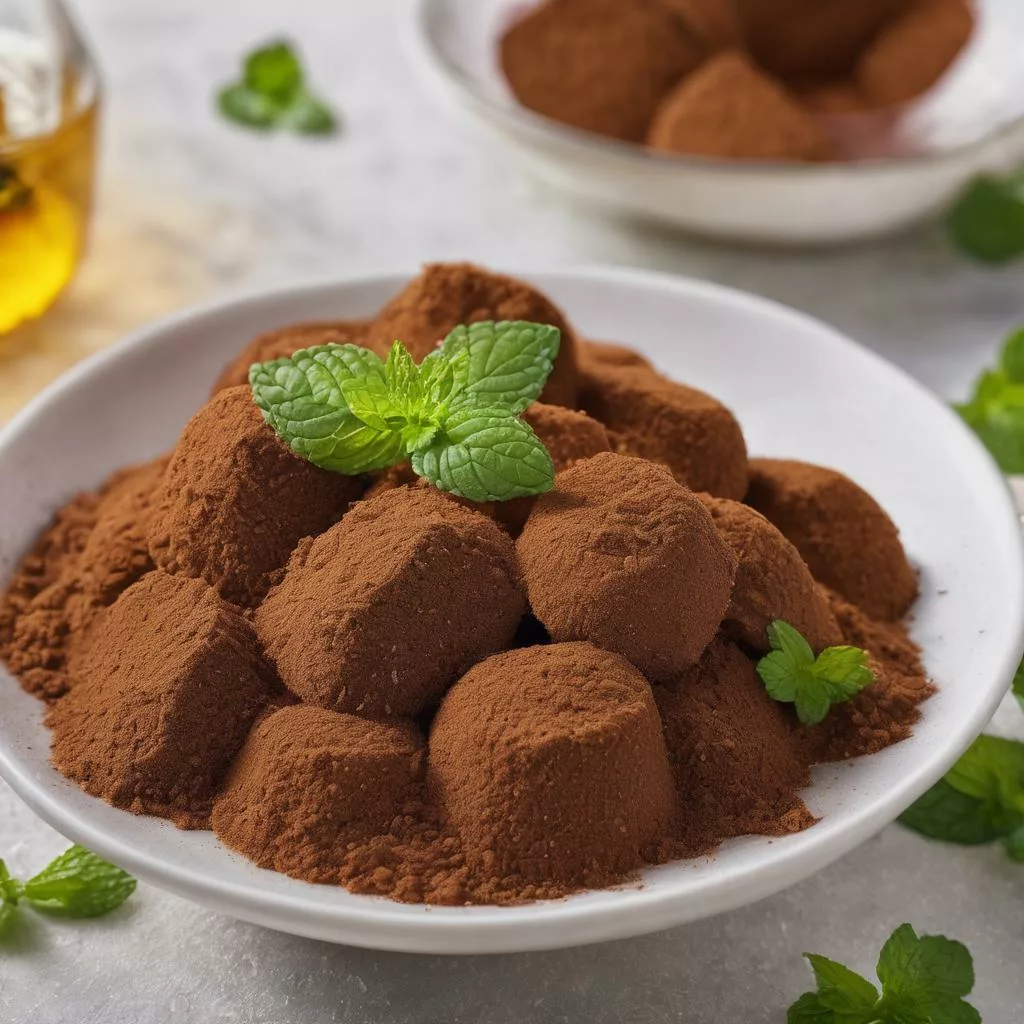
Are you familiar with the delightful aroma and refreshing taste of peppermint? If so, you may have come across two popular forms of this versatile herb: peppermint extract and peppermint oil. Both are derived from the same plant, but they have distinct characteristics and uses that set them apart. In this article, we will explore the differences between peppermint extract and peppermint oil, helping you understand when to reach for one over the other.
Peppermint extract is a concentrated flavoring derived from the leaves of the peppermint plant. It is commonly used in baking and cooking to add a burst of minty freshness to a variety of dishes. With its strong yet balanced flavor profile, it can elevate everything from cookies and cakes to ice creams and cocktails. On top of its delicious taste, peppermint extract also boasts antibacterial properties, making it a natural choice for preserving food. So whether you’re looking to whip up some irresistible treats or keep your culinary creations fresh for longer, adding a dash of peppermint extract can do wonders.
On the other hand, we have peppermint oil, a potent essential oil extracted from the leaves and stems of the peppermint plant through steam distillation. While not suitable for consumption like its extract counterpart due to its high concentration, it shines in therapeutic applications. Peppermint oil has long been praised for its medicinal benefits, such as relieving headaches, soothing muscle pain, easing indigestion, and even improving mental clarity. Its invigorating scent is often used in aromatherapy to promote relaxation and boost energy levels. So if you’re seeking natural remedies or looking to create a calming atmosphere at home or in your spa-like sanctuary, keep that bottle of pure peppermint oil within reach.
Now that we’ve introduced these two forms of minty goodness—peppermint extract with its culinary magic and antimicrobial prowess and potent peppermint oil with its therapeutic powers—let’s dive deeper into their properties, benefits, and when to use each one. With this knowledge in hand, you’ll be equipped to make the most of these versatile peppermint derivatives and enhance your culinary creations or wellness routines with ease.
Uses of Peppermint Extract in Baking and Cooking

Did you know that using peppermint extract in your baking and cooking can add a burst of refreshing flavor to your favorite recipes? Peppermint extract is a concentrated form of the essential oil found in peppermint leaves. It is commonly used in baking to enhance the taste of cookies, cakes, and other desserts. Just a few drops of peppermint extract can transform an ordinary recipe into something extraordinary. One of the main uses of peppermint extract in baking is to create deliciously flavored treats. Its strong minty flavor adds a refreshing twist to chocolate chip cookies, brownies, and even ice cream. Whether you’re making homemade candies or adding it to your hot cocoa, peppermint extract provides a unique and invigorating taste that will leave your taste buds wanting more.
Apart from its delightful taste, peppermint extract also offers numerous health benefits. Peppermint has been known for centuries for its soothing properties on digestion. It can help relieve symptoms such as indigestion, bloating, and stomach cramps. Incorporating peppermint extract into your baking can not only make your desserts taste great but also provide some potential digestive relief. Using peppermint extract in your baking and cooking is a fantastic way to add refreshing flavor to your dishes while reaping the potential health benefits it offers. From enhancing the taste of desserts to providing relief for digestion issues, this versatile ingredient can elevate any recipe. So why not give it a try? Your tastebuds will thank you!
Properties of Peppermint Extract
The invigorating aroma of this potent essence will transport you to a refreshing oasis, awakening your senses and leaving you feeling revitalized. Peppermint extract is not only known for its delightful scent, but also for its numerous benefits in baking and cooking. This versatile ingredient is derived from peppermint leaves and contains the natural compounds that give it its unique flavor profile. One of the key benefits of using peppermint extract in culinary creations is its ability to add a burst of minty freshness to any dish. Peppermint extract offers a range of culinary uses that can elevate your recipes to new heights. Its refreshing flavor pairs well with both sweet and savory dishes, making it a popular choice among chefs and home cooks alike.
In baking, peppermint extract can be used to infuse cakes, cookies, and chocolates with a cool minty taste. A few drops added to homemade ice cream or whipped cream can create a delectable treat that will leave your taste buds tingling with delight. Aside from its delicious flavor, peppermint extract also boasts several health benefits. It has been found to aid digestion by soothing stomach discomfort and reducing bloating. Additionally, studies have suggested that the menthol content in peppermint oil may help relieve headaches when applied topically or inhaled as part of aromatherapy.
So not only does using peppermint extract enhance the taste of your dishes, but it may also contribute positively to your overall well-being. Incorporating peppermint extract into your culinary creations can bring about both delicious flavors and potential health benefits. Whether you’re adding it to baked goods or experimenting with savory dishes, this versatile ingredient is sure to awaken your senses and leave you feeling revitalised. So go ahead and explore the many ways you can incorporate the invigorating properties of peppermint extract into your cooking repertoire today!
Benefits of Peppermint Extract in Cooking
Peppermint extract offers a refreshing minty flavor that can enhance the taste of your dishes. It is a versatile ingredient that can be used in various dishes, from desserts like chocolate chip cookies to savory dishes like roasted vegetables. Adding peppermint extract to your cooking not only adds a burst of flavor but also provides a unique and invigorating twist to your favorite recipes.
Refreshing Minty Flavor
Experience the invigorating burst of refreshing minty flavor that will awaken your taste buds and leave you feeling revitalized—all thanks to peppermint extract and oil! When cooking with peppermint extract, you can add a delightful touch of mint to your dishes. Whether it’s a homemade chocolate chip cookie or a creamy peppermint ice cream, the addition of peppermint extract brings an extra layer of flavor that is both cooling and uplifting. Not only does peppermint extract enhance the taste of your dishes, but it also offers numerous health benefits.
Peppermint oil, which is used to create the extract, has been found to have anti-inflammatory properties that can help soothe digestive issues such as bloating and indigestion. Additionally, studies have shown that inhaling the aroma of peppermint oil can improve focus and concentration. So not only will your food taste amazing with a hint of peppermint extract, but it may also provide some added health benefits to support your overall well-being.
Versatile Ingredients in Various Dishes
Versatile and vivacious, this minty ingredient can be incorporated into a multitude of mouthwatering dishes, adding a zesty zing that will leave your taste buds tingling. When it comes to cocktails, peppermint extract is a fantastic addition that can transform an ordinary drink into something extraordinary. Just a few drops of this potent extract can elevate classic cocktails like mojitos or martinis by infusing them with refreshing mint flavor. It also pairs beautifully with chocolate-based drinks like hot cocoa or creamy chocolate martinis, creating a delightful balance between the rich sweetness and cool minty notes. In addition to cocktails, incorporating peppermint extract in desserts opens up endless possibilities for creating delectable treats.
Whether you’re making cookies, cakes, or ice creams, adding a dash of peppermint extract can take your creations to the next level. Not only does it add a burst of freshness to traditional flavors like vanilla or chocolate, but it also adds depth and complexity to desserts with its invigorating aroma. From classic holiday favorites like peppermint bark or candy cane brownies to unique creations like mint-chocolate chip cheesecake or white chocolate peppermint mousse, there’s no limit to the delicious desserts you can whip up with this versatile ingredient. So go ahead and unleash your culinary creativity by experimenting with peppermint extract in cocktails and desserts. Your taste buds will thank you as they savor the vibrant and tantalizing flavors that this minty ingredient brings to every dish it touches.
You can also check how to use it in your tea by checking it out here
Uses of Peppermint Oil for Therapeutic Purposes
Indulge in the refreshing sensation of applying peppermint oil to your temples, relieving tension and invigorating your senses. Peppermint oil is known for its therapeutic benefits and aromatic properties, making it a popular choice for various therapeutic purposes. The soothing aroma of peppermint oil has been found to have a calming effect on the mind and body, helping to reduce stress and anxiety. In addition to its calming properties, peppermint oil also possesses pain-relieving qualities. When applied topically, it can help alleviate headaches and muscle soreness. The cooling sensation provided by peppermint oil helps to numb pain receptors and reduce inflammation, providing temporary relief from discomfort.
Furthermore, peppermint oil has been shown to aid digestion and relieve symptoms of indigestion such as bloating and gas. Its carminative properties help relax the muscles of the gastrointestinal tract, promoting better digestion. Additionally, inhaling the scent of peppermint oil can stimulate appetite and help with nausea or morning sickness. Overall, incorporating peppermint oil into your daily routine can provide numerous therapeutic benefits. From relieving tension and pain to aiding digestion, this versatile essential oil offers a natural alternative for promoting overall well-being. So go ahead, indulge in the refreshing experience of using peppermint oil for its therapeutic purposes – you won’t be disappointed!
Properties of Peppermint Oil
Feel the invigorating properties of peppermint oil as it awakens your senses and provides a refreshing burst of energy. Peppermint oil has been widely used in skincare due to its numerous benefits for the skin. Its antimicrobial properties help to combat acne-causing bacteria, while its cooling effect helps to soothe inflammation and redness. Additionally, peppermint oil can help regulate sebum production, making it an excellent choice for those with oily skin. Whether used as a spot treatment or added to facial cleansers, toners, or moisturizers, peppermint oil can be an effective ingredient in your skincare routine.
Apart from its skincare benefits, peppermint oil has also been found to promote hair growth. Its stimulating properties increase blood circulation to the scalp, which in turn nourishes hair follicles and promotes hair growth. Massaging diluted peppermint oil into the scalp can provide a tingling sensation that not only feels invigorating but also helps improve blood flow. Furthermore, peppermint oil is known for its ability to balance the pH levels on the scalp and reduce excess oil production, thereby preventing dandruff and promoting a healthier scalp environment for hair growth. Incorporating peppermint oil into your skincare routine can offer various benefits such as combating acne-causing bacteria and reducing inflammation. Its stimulating properties also make it a great choice for promoting hair growth by improving blood circulation and maintaining a healthy scalp environment. With these uses in mind, consider adding peppermint oil to your daily regimen for both refreshed skin and potentially improved hair growth.
Benefits of Peppermint Oil for Medicinal Purposes
Peppermint oil offers various benefits for medicinal purposes. It can provide relief from digestive issues and headaches, thanks to its ability to relax the muscles of the gastrointestinal tract and improve blood flow. Additionally, it serves as a natural remedy for muscle pain and stress by reducing inflammation and promoting relaxation.
Relief from Digestive Issues and Headaches
Soothe your upset stomach and pounding headache with the cooling touch of a refreshing peppermint remedy. Peppermint oil has been found to provide relief from digestive issues such as indigestion, bloating, and gas. Its natural properties can help relax the muscles in the gastrointestinal tract, allowing for easier digestion and reducing discomfort. Additionally, peppermint oil has soothing effects on the respiratory system, making it beneficial for alleviating symptoms of coughs, colds, and sinus congestion. Peppermint extract is another option that can provide similar benefits. However, it’s important to note that while both peppermint oil and extract come from the same plant, they have different concentrations of the active compounds. Peppermint oil is more concentrated and potent than extract, which means it may be more effective for treating certain conditions like headaches. On the other hand, peppermint extract can still offer relief from digestive issues but may require a higher dosage or a longer duration of use compared to peppermint oil. Whether you choose to use peppermint oil or extract for relief from digestive issues and headaches depends on personal preference and the severity of the symptoms. Both options have their own advantages and can be effective in their own ways. It’s always best to consult with a healthcare professional before using any herbal remedies to ensure they are suitable for your individual needs.
Natural Remedy for Muscle Pain and Stress
Ease your muscle pain and melt away stress with the power of a natural remedy. Peppermint extract and peppermint oil have long been used as natural remedies in alternative medicine to provide relief from muscle pain and stress. Peppermint contains menthol, which has analgesic properties that can help alleviate muscle soreness and tension. Applying peppermint extract or oil topically to the affected area can help relax muscles, reduce inflammation, and promote blood circulation, resulting in decreased pain and faster healing.
Peppermint also acts as a mild sedative, helping to calm the mind and relieve stress. The aroma of peppermint has been found to have a soothing effect on the nervous system, promoting relaxation and reducing anxiety. Additionally, inhaling the scent of peppermint oil or using it in aromatherapy can stimulate mental clarity and improve focus, making it an excellent natural remedy for relieving stress-related headaches. If you’re looking for a natural remedy to ease muscle pain and reduce stress levels, consider incorporating peppermint extract or oil into your routine. With its analgesic properties and calming effects on both the body and mind, peppermint is a valuable tool in alternative medicine for achieving physical relaxation and mental well-being.
Comparison of Peppermint Extract and Peppermint Oil
If you’re considering using peppermint for medicinal purposes, it’s important to understand the differences between peppermint extract and peppermint oil. One key difference is the strength and potency of each option. Peppermint oil is more concentrated and potent than peppermint extract, which means it may be more effective in treating certain conditions. When choosing between the two, consider your specific needs and consult with a healthcare professional to determine which option is best for you.
Differences in Strength and Potency When using peppermint extract,
You’ll notice that its strength and potency are not as intense as with peppermint oil. This is because peppermint extract is derived from the leaves of the peppermint plant through a process called extraction. Extraction methods for making peppermint extract typically involve soaking the plant material in a solvent, such as alcohol or water, to draw out the desired compounds. However, this process may not capture all of the volatile oils present in the plant, resulting in a less concentrated product. The strength and effectiveness of peppermint oil, on the other hand, are higher due to its extraction method and quality control measures. Peppermint oil is obtained through steam distillation or cold pressing of the peppermint plant’s aerial parts, which include both leaves and stems. These extraction methods ensure that a higher concentration of essential oils is obtained from the plant material. Additionally, reputable manufacturers often have stringent quality control measures in place to ensure that only high-quality peppermint plants are used for extraction. This helps maintain the potency and effectiveness of the oil by ensuring that it contains a consistent level of active compounds.
Choosing the Right Option for Your Needs
Deciding which option suits your needs best is crucial, as it directly impacts the strength and effectiveness you desire. When comparing peppermint extract vs peppermint oil, it’s important to consider their flavors and uses. Peppermint extract is made by soaking peppermint leaves in alcohol, resulting in a strong and concentrated flavor. It is commonly used in baking and cooking to add a refreshing minty taste to desserts and beverages. On the other hand, peppermint oil is extracted through steam distillation of peppermint leaves, producing a highly potent oil with a more intense flavor. It is often used for therapeutic purposes such as aromatherapy or as a natural remedy for digestive issues. When choosing between peppermint extract and peppermint oil, think about what you intend to use them for. If you’re looking to enhance the flavor of your baked goods or add a hint of mintiness to your recipes, then the concentrated flavor of peppermint extract would be ideal. However, if you’re interested in using it for its therapeutic benefits or want a stronger minty taste in your dishes, then opting for pure peppermint oil would be more suitable. Ultimately, both options have their own unique strengths and can be used based on personal preferences and specific requirements. Whether you choose peppermint extract or peppermint oil, make sure to read labels carefully and purchase from reputable sources to ensure high-quality products that meet your needs effectively.
Frequently Asked Questions
Can peppermint extract be used as a natural remedy for digestive issues?
Looking for a natural remedy to soothe your digestive issues? Well, look no further than peppermint extract! Packed with benefits, peppermint extract has been used for centuries to alleviate stomach discomfort. Its soothing properties can help relieve symptoms like bloating and indigestion. Not only that, but peppermint extract is also known for its ability to ease muscle spasms in the gastrointestinal tract, making it an effective treatment for irritable bowel syndrome (IBS). So why not give this natural solution a try and experience the relief it can bring to your digestive woes?
What are the potential side effects of using peppermint oil for therapeutic purposes?
When using peppermint oil for therapeutic purposes, it is important to be aware of the potential risks and take necessary precautions. Some individuals may experience side effects such as heartburn, allergic reactions, or skin irritation. Additionally, ingesting large amounts of peppermint oil can lead to digestive issues like diarrhea or stomach cramps. It is advised to dilute the oil before applying it topically and to start with a small amount to test for any adverse reactions. Pregnant or breastfeeding women should consult their healthcare provider before using peppermint oil. Overall, while peppermint oil can provide therapeutic benefits, it is crucial to be mindful of its potential side effects and take appropriate measures to ensure safe usage.
Is it safe to ingest peppermint extract in large quantities?
Ingesting large quantities of peppermint extract is generally safe, as long as it is used in moderation. Peppermint extract offers various health benefits, such as improving digestion, reducing headaches, and alleviating menstrual pain. It is commonly used for culinary purposes due to its strong flavor and aroma. When comparing peppermint extract and peppermint oil for culinary uses, they are both derived from the same plant but differ in concentration. Peppermint extract contains a lower concentration of essential oils compared to peppermint oil, making it more suitable for baking and cooking. However, it’s important to note that while ingesting small amounts of peppermint extract is safe for most people, excessive consumption may lead to digestive issues or allergic reactions. Therefore, it’s always best to use any food extracts or oils in moderation and consult with a healthcare professional if you have any concerns about their usage.
Can peppermint oil be used topically to relieve muscle pain?
To relieve muscle pain, peppermint oil can be a beneficial option. Its numerous benefits include soothing and cooling effects that can provide relief to sore muscles. Peppermint oil contains menthol, which has analgesic properties and helps to reduce inflammation. When applied topically, it can create a numbing sensation that alleviates muscle discomfort. Additionally, there are alternative topical remedies available for muscle pain relief, such as arnica gel or capsaicin cream. However, it is important to note that peppermint oil may cause skin irritation in some individuals, so it is advisable to perform a patch test before applying it extensively. Overall, with its peppermint oil benefits and potential alternatives like arnica gel or capsaicin cream, using peppermint oil topically can be an effective way to find relief from muscle pain.
How does the flavor of peppermint extract differ from that of peppermint oil?
Peppermint extract and peppermint oil differ in terms of flavor. Peppermint extract is derived from the leaves of the peppermint plant and is primarily used for its flavoring properties in baking, cooking, and beverages. It has a strong, refreshing taste that adds a distinct minty flavor to dishes. On the other hand, peppermint oil is extracted from the peppermint plant through steam distillation and is known for its various health benefits. While it can also be used as a flavoring agent, its primary uses include relieving digestive issues, soothing headaches, reducing muscle pain, and promoting relaxation. In terms of flavor alone, peppermint extract offers a more concentrated and intense mint taste compared to peppermint oil.
Conclusion
In conclusion, when it comes to choosing between peppermint extract and peppermint oil, it all boils down to your specific needs. If you’re a culinary enthusiast looking to add a refreshing twist to your dishes, peppermint extract is the way to go. Its versatile uses in baking and cooking make it a valuable ingredient in your pantry. On the other hand, if you’re seeking therapeutic benefits for ailments like headaches or digestive issues, peppermint oil is your best bet. Its potent properties and medicinal benefits have been recognized for centuries. While both options offer their own unique advantages, they are distinct in their uses and purposes. It’s like comparing a gentle breeze on a warm summer day (peppermint extract) with a powerful gust of wind that clears away all obstacles (peppermint oil). Each has its own rhythm and flow that can enhance different aspects of your life. So whether you choose the soothing aroma of peppermint extract wafting through your kitchen or the invigorating effects of peppermint oil on your well-being, rest assured that both options have been backed by evidence-based research and have stood the test of time. The choice is yours: embrace the culinary delights or indulge in the therapeutic wonders of this remarkable herb!


